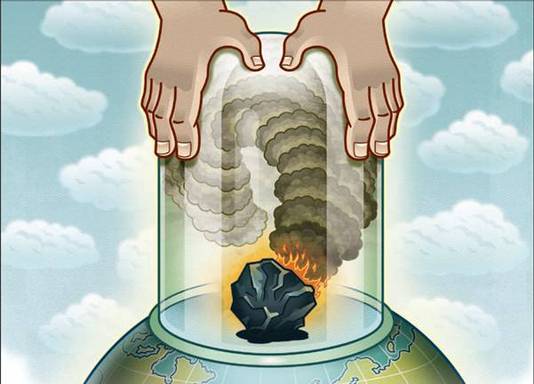The global energy consumption is heavily dependent on the energy generated from fossil-fuels. Although there are efforts to curb CO2 emissions by means of expanding the capacity for the renewable energy, we see that it is hardly enough to cover the rising energy demand. Hence the fossil-fuel generation seems to be anchored, stubborn to go down. One way out of this can be the Carbon Capture and Storage (CCS) technology, and Norway is the leading country in this respect (although the Boundary Dam Integrated CCS project in Canada is planned to be completed and able to commence the capture and storage of carbon by November, 2013). Hence, thinking that CCS is a viable option, we wanted to analyze the optimality of the technology in a global perspective, and decided to do this in the presence of technological change. In other words, in doing this we allowed for research and development decisions regarding the fossil-fuel energy, renewable energy and CCS technologies. Well, the results have come as a little surprise. I have attached the abstract below. For the interested reader, here is the link for the paper:
Evaluating Carbon Capture andStorage in a Climate Model with Directed Technical Change
Abstract:
Carbon capture and storage (CCS) is considered a critical technology needed to curb CO2 emissions and is envisioned by the International Energy Agency (IEA) as an integral part of least-cost greenhouse gas mitigation policy. In this paper, we assess the extent to which CCS and R&D in CCS technology are indeed part of a socially efficient solution to the problem of climate change. For this purpose, we extend the intertemporal model of climate and directed technical change developed by Acemoglu et al. (2012, American Economic Review, 102(1): 131{66) to include a sector responsible for CCS. Surprisingly, even for an optimistic cost estimate available for CCS ($60/ton of CO2 avoided), we find that it is not optimal to deploy CCS or devote resources to R&D in CCS technology either in the near or distant future. Indeed, it is only when the marginal cost of CCS is less than $12/ton that a scenario with an active CCS sector (including R&D) becomes optimal, though not in the near future.
--
You can view this post also @Reconhub
Evaluating Carbon Capture andStorage in a Climate Model with Directed Technical Change
Abstract:
Carbon capture and storage (CCS) is considered a critical technology needed to curb CO2 emissions and is envisioned by the International Energy Agency (IEA) as an integral part of least-cost greenhouse gas mitigation policy. In this paper, we assess the extent to which CCS and R&D in CCS technology are indeed part of a socially efficient solution to the problem of climate change. For this purpose, we extend the intertemporal model of climate and directed technical change developed by Acemoglu et al. (2012, American Economic Review, 102(1): 131{66) to include a sector responsible for CCS. Surprisingly, even for an optimistic cost estimate available for CCS ($60/ton of CO2 avoided), we find that it is not optimal to deploy CCS or devote resources to R&D in CCS technology either in the near or distant future. Indeed, it is only when the marginal cost of CCS is less than $12/ton that a scenario with an active CCS sector (including R&D) becomes optimal, though not in the near future.
--
You can view this post also @Reconhub

 RSS Feed
RSS Feed
